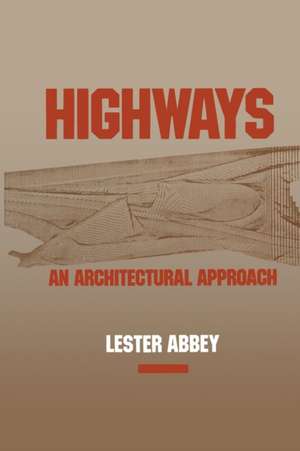Highways: An Architectural Approach
Autor Lester Abbeyen Limba Engleză Paperback – 24 feb 2012
Preț: 640.88 lei
Preț vechi: 753.97 lei
-15% Nou
Puncte Express: 961
Preț estimativ în valută:
122.66€ • 132.41$ • 102.85£
122.66€ • 132.41$ • 102.85£
Carte tipărită la comandă
Livrare economică 19 aprilie-03 mai
Preluare comenzi: 021 569.72.76
Specificații
ISBN-13: 9781468465174
ISBN-10: 1468465171
Pagini: 320
Ilustrații: 319 p.
Dimensiuni: 152 x 229 x 17 mm
Greutate: 0.43 kg
Ediția:Softcover reprint of the original 1st ed. 1992
Editura: Springer Us
Colecția Springer
Locul publicării:New York, NY, United States
ISBN-10: 1468465171
Pagini: 320
Ilustrații: 319 p.
Dimensiuni: 152 x 229 x 17 mm
Greutate: 0.43 kg
Ediția:Softcover reprint of the original 1st ed. 1992
Editura: Springer Us
Colecția Springer
Locul publicării:New York, NY, United States
Public țintă
ResearchDescriere
What is highway architecture? Who are the highway architects? Where do they practice? What is their role? WHAT IS HIGHWAY ARCHITECTURE? Highway architecture is a way of attempting to achieve the best of both worlds by shepherding a highway project from planning through design, construction, and operation. It is an approach to rebuilding our highway infrastructure, from a humanistic rather than strictly an engineering point of view. Continuity of purpose is the prime objective. A corollary goal is to make the highway an integral part of its setting. As now practiced, the building or rebuilding of anyone highway is partitioned, fragmented, and compartmentalized. Planners hand a concept to designers; design ers then prepare plans and specifications and pass their work on to construction people; construction people build the highway and turn it over to maintenance personnel. Rarely does one find continuity from planning to operation of a facility. WHO ARE THE HIGHWAY ARCHITECTS? Although it is unlikely that anyone hands out a business card with occupation listed as "Highway Architect," this does not mean that no one practices the profession. Highway architects are those people who share the responsibility for developing a highway project. True, the practice is quite limited, but site development entrepre neurs, rural county engineers, landscape architects, and consultants to smaller local governments often perform as highway architects. They take a project from concep tion to completion and are concened with how the local community will react to it.
Cuprins
Preface. Part 1: Planning. Overview. Alternatives. Multiple use and joint development. Part 2: Preliminary design. Mapping. Construction materials and foundations. Water. Pavements. Environment. Geometry. Part 3: Final design. Earthwork. Drainage and erosion control. Structures. Intersections and interchanges. Roadside. Right-of-way. Plans, specifications and estimates. Construction. Contracts and risk management. Part 4: Construction. Contracts and risk management. Construction items. Safety. Inspection. Part 5: Operation. Traffic. Maintenance. Intelligent Vehicle/Highway Systems (IVHS). Index.








